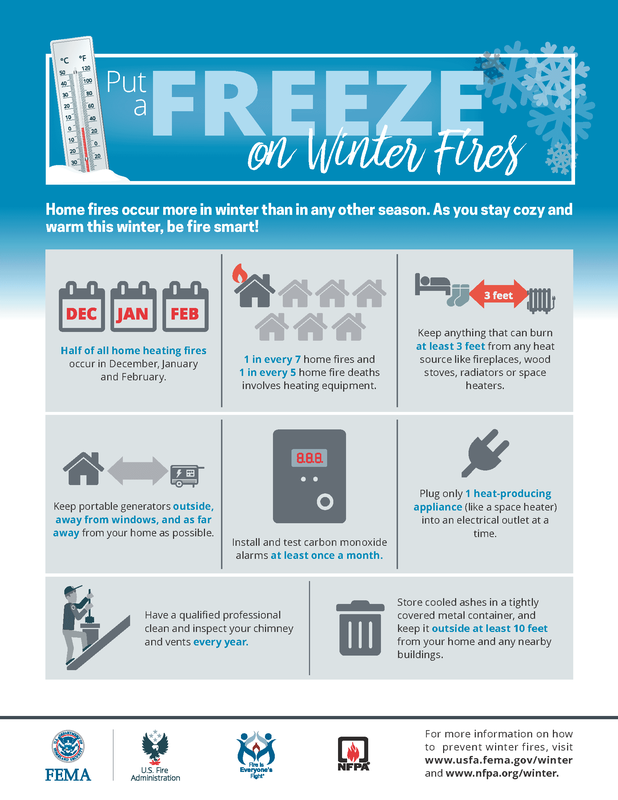| Protect yourself and your loved ones during a winter storm. Take extra steps to make sure you heat your home safely, and follow the tips below.
Heat your home safely.
If you plan to use a wood stove, fireplace, or space heater, be extremely careful. Follow the manufacturer's instructions and remember these safety tips:
-Have extra heat sources in case the power goes out.
-Have at least one of the following heat sources in case the power goes out:
-Extra blankets, sleeping bags, and warm winter coats.
-A fireplace that is up to code with plenty of dry firewood or a gas log fireplace
-Portable space heaters or kerosene heaters. Check with your local fire department to make sure that kerosene heaters are legal in your -area.
Keep in mind:
-Turning on the stove for heat is not safe!
-Use space heaters safely.
-Use electric space heaters with automatic shut-off switches and non-glowing elements.
-Keep heat sources, like space heaters, at least 3 feet away from drapes, furniture, bedding, or other flammable materials. Never cover -your space heater.
-Never place a space heater on top of furniture or near water.
-Never leave children unattended near a space heater.
-Make sure that the cord of an electric space heater is not a tripping hazard, but do not run the cord under carpets or rugs.
-Avoid using extension cords to plug in your space heater.
-If your space heater has a damaged electrical cord or produces sparks, do not use it.
Follow additional heat safety guidelines:
-Use fireplaces, wood stoves, or other combustion heaters only if they are properly vented to the outside and do not leak gas from the flue or exhaust into the indoor air space.
-Make sure you have proper ventilation if you must use a kerosene heater.
-Have your heating system serviced by a qualified technician every year.
-Do not burn paper in a fireplace.
-Use only the type of fuel your heater is designed to use—don't substitute.
If there is a power failure:
-Use battery-powered flashlights or lanterns rather than candles, if possible.
-Candles can lead to house fires. If you do use candles, never leave lit candles unattended.
-Use generators and other appliances safely.
-Generators should be located at least 20 feet from any window, door, or vent and in a space where rain and snow will not reach them.
-Protect yourself from carbon monoxide (CO) poisoning by installing a battery-operated CO detector.
-Never using generators, gas or charcoal grills, camp stoves, or similar devices inside your home, in basements, in garages, or near windows. The fumes are deadly.
-Plug in appliances to the generator using individual heavy-duty, outdoor-rated extension cords.
-Do not use the generator or appliances if they are wet.
-Do not store gasoline indoors where the fumes could ignite.
Conserve heat:
-Some gas-fueled heaters, such as vent-less gas fireplaces, require some ventilation. Otherwise, if you don't need extra ventilation, keep as much heat as possible inside your home.
-Avoid unnecessarily opening doors or windows.
-Close off unneeded rooms.
-Stuff towels or rags in cracks under doors.
-Close draperies or cover windows with blankets at night.
Make sure babies and older adults stay warm.
Infants less than one year old should never sleep in a cold room because they lose body heat more easily than adults. Follow these tips to keep your baby safe and warm during the extreme cold:
-Remove any pillows or other soft bedding. These can increase the risk of smothering and Sudden Infant Death Syndrome (SIDS).
-Dress babies in warmer clothing such as footed pajamas, one-piece wearable blankets, or sleep sacks.
-Try to maintain a warm temperature inside your home. If you're not able to keep your home warm, make temporary arrangements to stay elsewhere.
-In an emergency, you can keep your baby warm using your own body heat. If you must sleep, take precautions to prevent rolling on or smothering your baby.
Older Adults
-Older adults often make less body heat because of a slower metabolism and less physical activity. Check on older friends and neighbors often to make sure their homes are heated properly.
If you are over 65 years of age, check the temperature in your home often during extremely cold weather.
For more winter safety information, follow the below link:
https://publichealth.jhu.edu/2024/winter-safety-and-injury-prevention |

